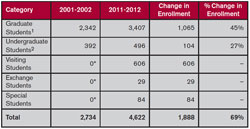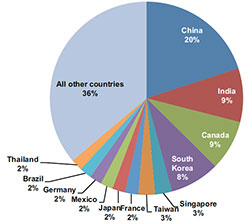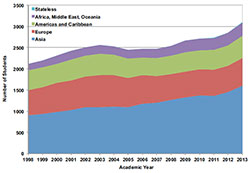
| Vol.
XXV No.
5 May / June 2013 |
| contents |
| Printable Version |
Support for the Rising Complexity
of
MIT's International Students
MIT has had a long history of welcoming students from around the world. Over the past decade, MIT has seen a significant rise in the number of international students, to a total of 4,622 for the 2011-2012 academic year – an increase of 69% (see table). Currently, 28% of degree-seeking students at MIT are international (10% of whom are undergraduate and 40% graduate according to the 2012-2013 Registrar's "Y" Report) originating from 112 different countries and from all regions of the world (for further details see Figures 1 and 2). Asia represents the largest fraction of the international degree-seeking student population, with China, India, Canada, South Korea, and Singapore the top enrolling countries, respectively.

(click on image to enlarge)

(click on image to enlarge)

(click on image to enlarge)
The growth in MITs international student population is reflective of the Institute’s extensive global engagements and commitment to global education (global.mit.edu). Examples range from large institutional initiatives (e.g., collaborations with The Masdar Institute of Science and Technology, The Skolkovo Institute of Science and Technology, the Abdul Latif Jameel Poverty Action Lab (J-PAL),The Singapore University of Technology and Design (SUTD), The MIT-Portugal Program, as well as the MIT International Science & Technology Initiatives, etc.), to curricular and co-curricular programming (e.g., The Sloan Action Labs, The MIT Pubic Service Center (PSC), The MIT Ideas Global Challenge,The MIT-Imperial Global Fellows Program, The MIT-China Innovation and Entrepreneurship Forum (MIT-CHIEF), etc.), and extensive individual faculty-driven research collaborations.
MIT strives to support our international graduate students and enrich their educational experience in a number of ways.
Personal Support
Various Institute offices are able to tailor their services to international students: undergraduate students may take advantage of Student Support Services (within the Office of the Dean for Undergraduate Education or DUE), while graduate students are aided by the Office of the Dean for Graduate Education (ODGE), which supplies one-on-one advising support; and all students may seek financial help with Student Financial Services (within DUE).
Personal support for international students is often intertwined with immigration advising. The International Students Office (ISO), within the ODGE, is an additional resource, as staff members have significant knowledge and training in immigration expertise and the specific challenges international students face.
The above resources support international students in areas such as cultural acclimation, the unique aspects of U.S. academic programs, English language proficiency, healthcare, insurance, and medical conventions, as well as personal support for students whose home countries are undergoing political unrest, natural disasters, and many other situations unique to international students. The ODGE, ISO, and S^3 work closely with MIT Medical, which provides a variety of mental health counseling and community wellness. MIT Medical also has its own Program Manager for International Families.
Supporting Immigration Status
The ISO also handles work associated with maintaining the legal immigration status of our international students, their dependents, and the approximately 650 international MIT alumni each year who have recently graduated and are working in the United States on work authorization. After September 11, 2001, the scale and the complexity of immigration regulations increased dramatically, including an increase in the number of U.S. and other organizations having jurisdiction over different aspects of each international student’s life.
The ISO must report to various government agencies on a multitude of data, from current registration status to areas of study and dependents. In order to electronically manage this data, the government created the Student Exchange Visitors System (SEVIS); the ISO additionally deployed SUNAPSIS in collaboration with IS&T, a Web-based application to facilitate data integration between SEVIS and the MIT Student Information System. Many of ISO’s business practices have been converted from paper to electronic in the past few years, with over 5,000 international electronic student files handled through SUNAPSIS.
| Back to top |
Fostering an Inclusive Campus Culture
International students have found an astonishing number of ways to contribute to the culture and fabric of MIT. Activities range from serving as officers for their residence or the student government, to designing an innovative project to improve the quality of life in communities throughout the world via the MIT IDEAS Global Challenge (run by the Public Service Center), to organizing internationally-focused career fairs.
MIT is committed to fostering a caring and inclusive campus environment, which begins from the moment students engage in Orientation their first year. The International Students Office organizes an International Orientation for incoming freshmen with an emphasis on welcoming and informative activities. Sharing across cultures abounds in the residences, both in a casual way and through programs such as SPICE, the Sidney-Pacific Intercultural Exchange, co-sponsored by the Office of the Dean for Graduate Education. SPICE brings students together for approximately 85 dinner and discussion meetings per year on topics from norms and taboos, to holidays, to interracial and cross-cultural relationships. The Addir Interfaith Program, run out of MIT Religious Life, brings students of different faiths together to learn about each other’s beliefs, practices, traditions, and cultures. The International Students Office also organizes Jeanty Teas, which celebrate a specific theme, such as the Year of the Snake or Halloween, and the Host to International Students Program (HISP), which matches incoming international undergraduate students with MIT faculty, staff, alums, and friends. The matches then engage in activities that expose the students to aspects of U.S. life, and allow the hosts to learn about other cultures and perspectives.
Over 60 active cultural student groups also contribute to cultural understanding, including the Arab Student Organization, the Bulgarian Club, the Organization of Serbian Students, Sangam (association of Indian students), and Stammtisch (a German conversation group).
To improve campus culture for international students still further, the Office of the Dean for Graduate Education invites proposals from faculty, students and staff at any time (http://odge.mit.edu/finances/activities-community/).
Career Development
Sources of support for career development for international students include the Global Education and Career Development Office (GECD) within the Office of the Dean for Undergraduate Education and activities organized by the Graduate Student Council Academics, Research and Careers committee, including the Fall Career Fair. Each year GECD organizes a workshop to introduce international students to the process of a job search in the U.S.; they also run a workshop on “Business Etiquette: Mastering Meals, Manners and Business Interactions” that is quite popular with internationals. They have career counselors with international experience who are available for one-on-one meetings, as well as an extensive career library and online resources that include hundreds of job postings that welcome international students.
Increased Support for the Expanding International Student Population
The Office of the Dean for Graduate Education is pleased to announce that the International Students Office will add an additional International Student Advisor as of July 1, 2013, thanks to the support of the Provost and the Chancellor. The new advisor will join the team that counsels and advises MIT students and their dependents on all issues related to their stay in the U.S., including personal and family matters. The advisor will help not only to support the additional numbers of MIT international students, but also to help address the increasing complexity of supporting their immigration status.
To help foster an inclusive campus culture, the ISO enhanced the undergraduate International Orientation this past year. The number of mentors was increased, reducing the ratio to 1:4 (down from 1:8 in previous years). A session on academic integrity was added, the calendar was expanded with more evening social and bonding activities, and “USA 101” was enhanced. The GECD has responded to the needs of international students by adding targeted speakers to its roster of events: in April, Dan Baudry, author of “Power Ties: The International Student’s Guide to Finding a Job in the United States” came to share inside information with over 200 attendees. Initiatives in this arena sponsored by the ODGE have included the MIT-China Innovation and Entrepreneurship Forum (MIT-CHIEF); a China Urban Development seminar series; and the MIT-India Conference.
Many offices at MIT partner to form a supportive web for all our international students. As MIT increases its global reach and embraces the rich complexity of those interactions, there are many generous and capable staff members who stand ready to meet the challenge to support our international students. We are eager to engage in the continuing conversation about how best to support the changing needs of MIT’s international students, and we encourage you to contact any of the authors of this article.
| Back to top | |
| Send your comments |
| home this issue archives editorial board contact us faculty website |